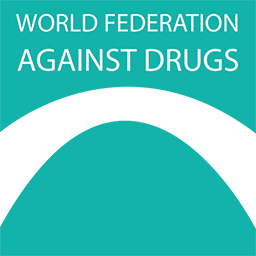Read WFAD President Esbjörn Hörnberg’s Statement at the Reconvened sixty-first session of CND in Vienna 5-7 december 2018.
“The way forward
Dear Chair and Excellences, colleagues and friends,
On behalf of two international networks, IOGT International and World Federation Against Drugs, with more than 300 Local and National Member Organisations globally, working with the full range from prevention to recovery I would like to make the following remarks:
Reduce drug use prevalence.
The overarching goal of every Member State’s drug policy should be reducing the prevalence of drug use. This will lead to lower numbers of problematic drug users, as well as a reduction in numbers of adolescents who are exposed to drug use in their peer group. Member States should monitor drug use prevalence regularly and adjust policies based on results to make prevention programmes more efficient.
Mobilize a million communities
Evidence-based prevention efforts are even more effective when they are synergistic and implemented by local communities. Local initiatives should involve local authorities and public services, schools, police, parent groups, community-based organisations, sports clubs, religious groups etc. The UNODC International Standards on Drug Use Prevention list a broad selection of recommended interventions that should be adopted by Member States as critical tools to promote health and development through community programmes.
Prioritize early intervention and assistance to vulnerable groups
Turning risk factors into protective factors is a key component of well-known efforts to protect and promote the well-being and development of our children, adolescents and youth. Therefore, schools and local communities should set up systems to assist vulnerable groups, particularly children. Identifying and helping youth who struggle with childhood trauma, family problems, abuse, school attendance, and other problems is important. At such an early stage, even simple interventions by teachers, health or social workers, and family and neighbours can make a great difference.
Offer treatment, rehabilitation, and harm-reduction alternatives
Based on the principle of non-discrimination, all people with drug use disorders must have access to a wide range of services and comprehensive care. Treatment, harm reduction, and rehabilitation should be integrated. Such services must also aim at maximizing the affected individuals’ possibility for recovery, and include family and friends. Empowering those affected by drug use disorders through connecting the individuals’ own resources with health care providers is essential to reducing mortality and morbidity while preserving dignity and self-respect and empowering agency of affected people and communities.
Organize local support systems after specialized treatment
Failing to reintegrate those who have completed specialized treatment back into their communities wastes resources and causes human suffering. Treatment programmes must plan for reintegration with society afterwards; a place to live, meaningful work, a social network, and meaningful leisure activities. Treatment centres and local
municipalities must coordinate reintegration from the very start of the treatment programme.
Support self-help groups for drug users and those in recovery
Across the globe, self-help groups for drug users (current users as well as those in recovery), have proven successful as a tool for escaping from drug abuse and reintegration into society after treatment. Such groups are therefore a very useful complement to more formal treatment services, and should be integrated into the totality of treatment and recovery services in all countries.
Support alternative development
A development approach aimed at improving people’s quality of life is needed to mobilize local communities where illicit drugs are produced. Governments in these countries should fund alternative development programmes in drug-producing areas. The most conflict-ridden countries in Latin America, (West) Africa and Asia need support from the international community. Good governance is also a critical part of alternative development; if corruption is not controlled, drug-related crime cannot be controlled.
Develop and implement alternatives to incarceration
Several countries have already implemented an array of diversion programs to replace incarceration or fines as reaction to minor drug offences, including dissuasion commissions, youth contracts, drug courts, and rehabilitation programs for drug users. More countries should follow suit and experiences should be shared internationally, organized through UNODC.
Implement the principle of proportionality in sanctions
Sanctions for drug-related offences must be proportional to the crime committed. The international drug conventions do not demand incarceration for drug users. Rather, they encourage prevention, treatment, and rehabilitation as alternatives. These approaches focus on treating the substance abuse disorder underlying criminal activity. Additionally, militarization of law enforcement, capital punishment and other inhumane and disproportionate methods should be abolished as they are not in accordance with the spirit of UN conventions.
Drug use is a multifaceted problem with bio-socio-psychological origin. That is why civil society can bring powerful results when it addresses all these elements on various levels.
Civil society has the advantage of being more flexible, of being rooted among people – those it serves and in understanding the structures of governance in their country. Those are strong tools for solving the problem and creating the change we want to see in the world.
Prevent – don’t – promote.”


Leave a Reply
You must be logged in to post a comment.